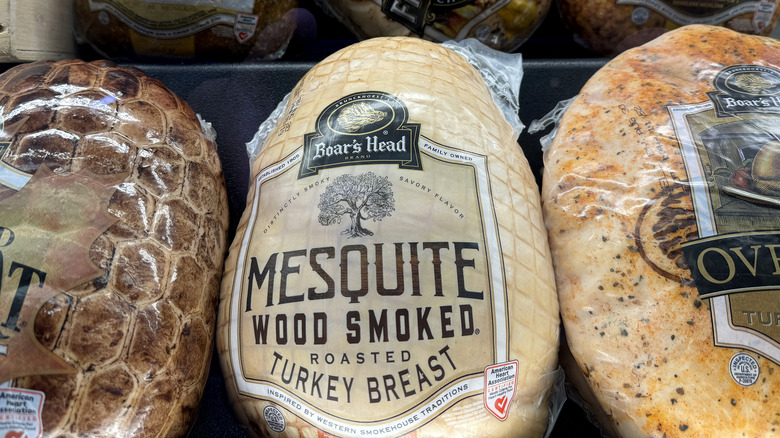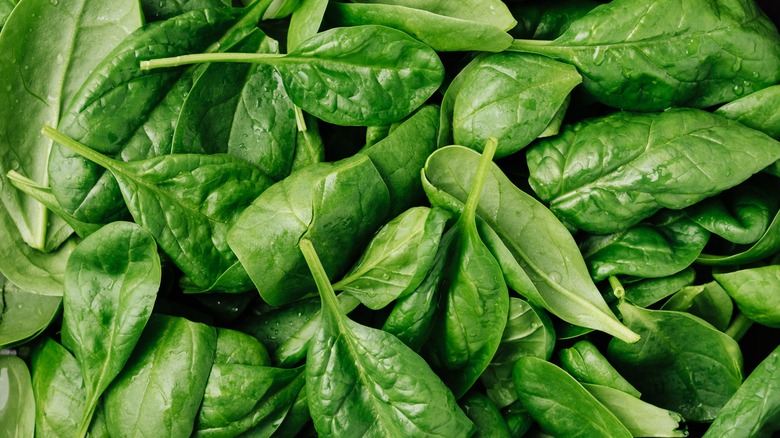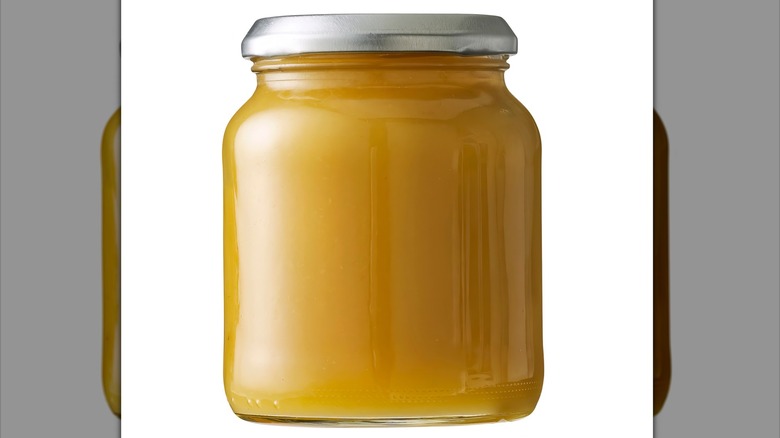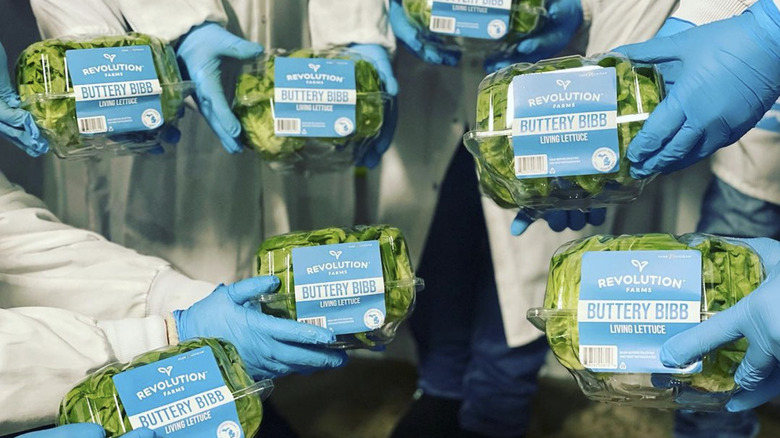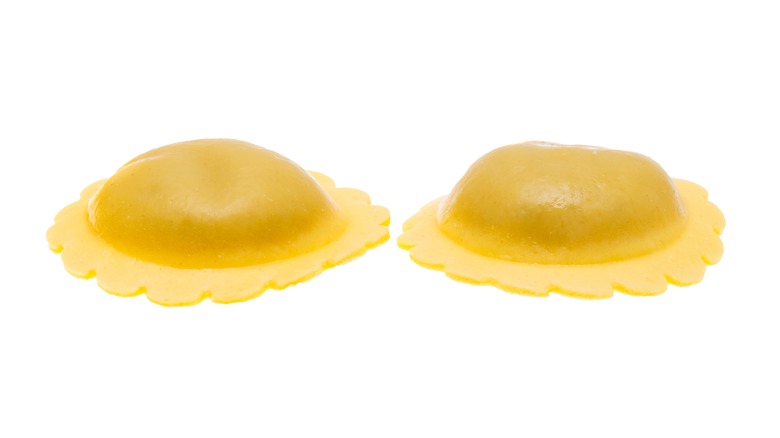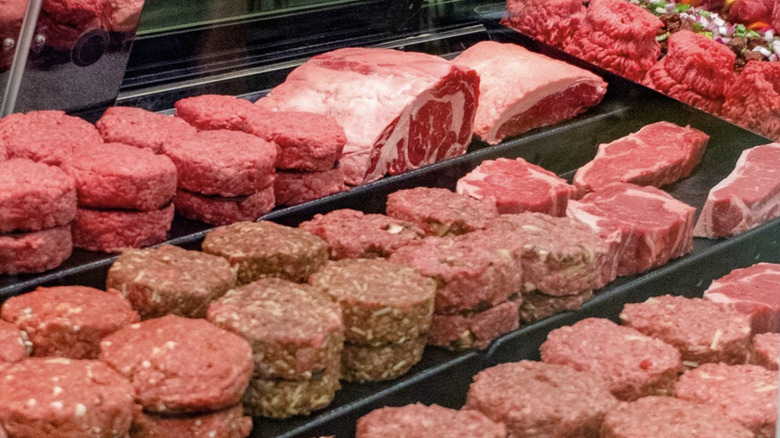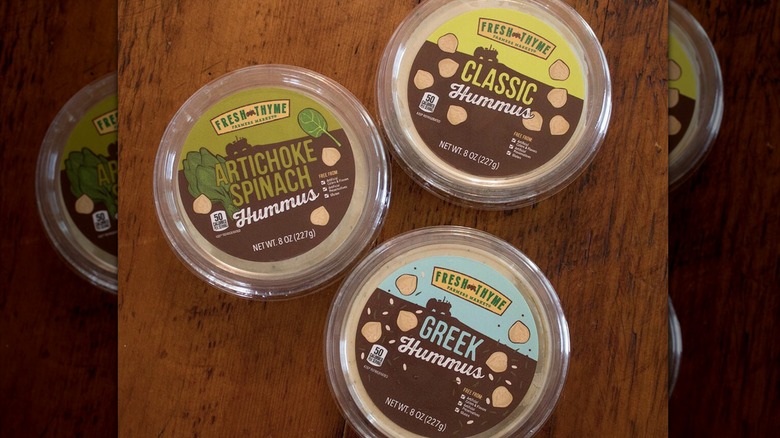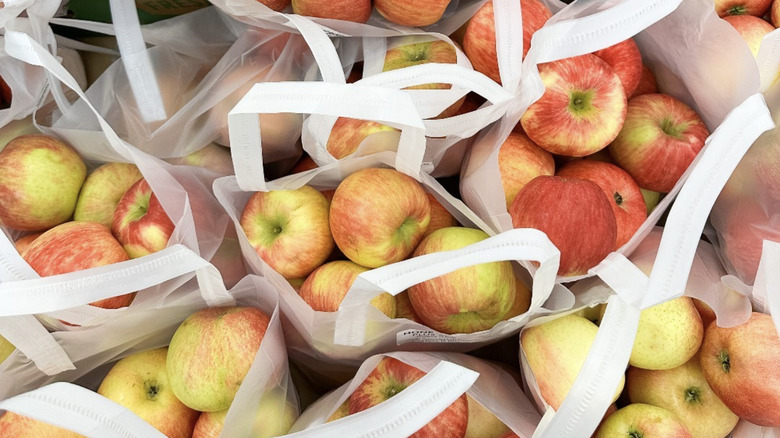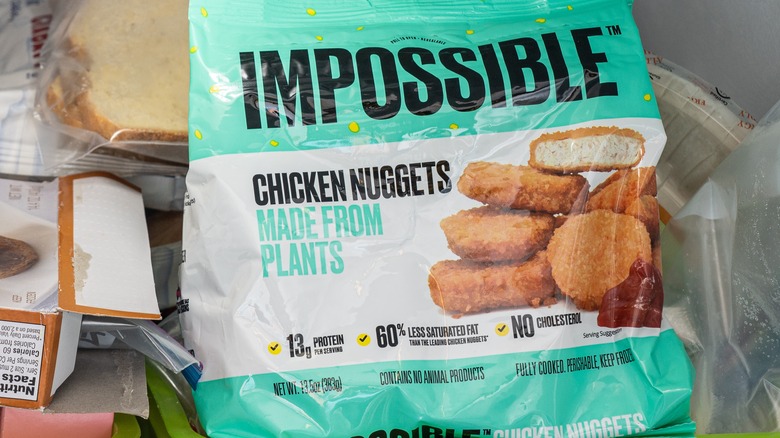The Biggest Food Recalls In Fresh Thyme History
Fresh Thyme Market opened its doors in 2014 and quickly became a darling of the grocery store scene. Customers count on Fresh Thyme's range of organic food, plentiful produce selection, and its emphasis on sustainable eats and healthy living. Yet, like any grocery store that's been around long enough, Fresh Thyme has had to face many food recalls. The ones we'll discuss here were some of the biggest in the store's history.
Although Fresh Thyme hasn't been hit with as many food recalls as other, older grocery stores such as Whole Foods' recalls, those it has dealt with have resulted in some eye-catching numbers. The Food and Drug Administration (FDA) and the United States Department of Agriculture (USDA) monitor the practices of food production plants all over the country and ensure that internationally imported foods meet American food safety guidelines. If these federal agencies don't catch a food safety violation and a contaminated or mislabeled product is sold to consumers, people can wind up sick or hurt.
No grocery store is immune from food recalls, of course, and the truth is that Fresh Thyme hasn't always handled the situation gracefully. But when a recall is needed, even the healthiest foods become potentially dangerous to eat until the situation is rectified. Let's look at some of the biggest food recalls to impact Fresh Thyme's shelves.
Boar's Head deli meats in 2024
To call the Boar's Head situation a bit of a mess would be an understatement. On July 26, 2024 Boar's Head launched a recall for its liverwurst after a sample tested by the Maryland Department of Health confirmed the meat was contaminated with Listeria monocytogenes. Boar's Head decided to recall other types of deli meat that were processed on the same line and on the same day as the liverwurst. Yet the 207,528 pounds of recalled product was just the tip of the iceberg, while Fresh Thyme's response to the rapidly expanding recall was less than tasteful.
Days after the initial recall notice, Boar's Head widened the scope and recalled 71 products due to the listeria risk. As more and more grocery stores nixed Boar's Head products from inventory, a Fresh Thyme in downtown Milwaukee was marking Boar's Head items (which were technically not looped into the recall) on clearance. Fresh Thyme's attempt to offload its Boar's Head supply didn't quite align with the community-oriented service the chain champions.
Though it's a favorite brand of Mashed readers, Boar's Head wound up recalling an additional 7 million pounds of deli meat as a result of the listeria outbreak. The contamination was responsible for 34 known illnesses across 13 states. As of early August 2024, 33 people were hospitalized and two died, allegedly as a result of the contamination, while some are filing lawsuits. As of this writing, Fresh Thyme is still selling select Boar's Head items but the frankly devastating recall remains ongoing.
Organic baby spinach in 2021
Baby spinach seems harmless, even cute, until a bad batch creates a dangerous situation for consumers. That's precisely what happened at Fresh Thyme in 2021, when its brand-name prepackaged organic baby spinach was part of a multi-state outbreak of E. coli O157:H7. Fresh Thyme and Josie's Organics were the two baby spinach brands implicated in the public health crisis and were both carried by the chain.
In October 2021, two Minnesota residents fell ill after eating organic baby spinach. One had consumed Josie's Organics and the other the Fresh Thyme brand. This gave the Minnesota Department of Health (MDH) and the Minnesota Department of Agriculture (MDA) cause to investigate Braga Fresh, the company responsible for producing both brands. Meanwhile, the number of reported E. coli O157:H7 cases rose to 10 and spanned seven states, with two cases requiring hospitalization. The FDA traced Braga Fresh's supply chain to a few different farms.
Public health announcements were issued warning customers not to eat Josie's Organics or Fresh Thyme organic baby spinach with a best-by date on or around October 23, 2021. They were directed to dispose of any remaining packages. As people continued to get sick, an investigation into the source of the E. coli O157:H7 outbreak proved inconclusive. The Centers for Disease Control (CDC) grappled with the outbreak until early January 2022. Contaminated baby spinach linked to Josie's Organics and Fresh Thyme caused 15 reported illnesses in 10 states and four total hospitalizations.
Blackberries in 2019
Public health alerts for fresh produce are a troubling reminder that not all instances of food contamination happen at the processing plant. Consider the hepatitis A outbreak traced to Fresh Thyme blackberries, which triggered a widespread food safety alert in 2019. Between October 8 and November 15, 2019, hepatitis A cases began stacking up in Michigan, Minnesota, Missouri, Nebraska, Pennsylvania, and Wisconsin. Public health officials investigated learned that 19 of the 20 individuals who contracted the virus in that timeframe had one thing in common: they'd all eaten fresh blackberries.
Out of the 17 cases where the purchase location of the blackberries was known, 16 confirmed the blackberries were bought from either Fresh Thyme Market or Woodman's Market. The FDA and CDC embarked on a traceback mission that led them to growers in Michoacán, Mexico. The FDA took fresh blackberry samples at a designated port of entry, but the specimen tested negative for the pathogen.
Difficulties surrounding traceability prevented investigators from obtaining more details about the source of the contamination or harvesting and processing practices in Michoacán. However, hepatitis A outbreaks typically occur due to fecal contamination in irrigation water, a lack of hygiene during harvesting and/or packing, or tainted water used to wash produce.
Brie and camembert in 2022
Old Europe Cheese Inc. of Benton Harbor, Michigan was in the throes of a big-time recall in September 2022 for its brie and soft, earthy camembert cheeses. A federally-led investigation of a listeria outbreak — which resulted in six reported illnesses in six states — was traced back to the company's soft cheeses. Old Europe Cheese produced brie and camembert under dozens of brand names nationwide and in Mexico. Fresh Thyme was one of the stores selling potentially bacteria-laden cheeses under its store-brand label.
An audit of 120 samples of Old Europe Cheese, as well as swabs from its manufacturing facilities, triggered the initial recall. None of the samples tested positive for listeria; however, listeria was detected in a hole in a facility floor, a floor drain, and a hallway. On October 5, 2022 — less than a week after the recall announcement — Old Europe Cheese initiated a recall expansion for multiple varieties of baked brie.
The CDC terminated the recall on December 9, 2022, but Old Europe Cheese's trouble didn't end there. On March 17, 2023, the FDA issued a warning letter to the cheese manufacturer, stating that the measures the company claimed to have taken in its processing facility were not in full compliance with federal regulations. As of this writing, Fresh Thyme still sells store-brand brie, though it is unclear if Old Europe Cheese is still the distributor.
Organic unsweetened applesauce in 2023 and 2024
A jar of unsweetened applesauce looks right at home on a Fresh Thyme shelf — until it doesn't. Vermont Village Organic Unsweetened Applesauce may not have been the health food it was cracked up to be after a recall made waves in November 2023. The brand's organic applesauce contained elevated levels of patulin, a mycotoxin produced from mold that forms on apples. Patulin is a naturally-occurring toxin that is potentially carcinogenic to mammals that consume it in large quantities. Food poisoning by way of patulin is known to cause gastrointestinal and neurological distress. Patulin thrives on apples that are bruised or sustain insect damage — a recall on an apple product due to its patulin levels often denotes that lower quality apples were used in the manufacturing process.
The FDA monitors patulin levels in apple products and if the numbers are too high, a recall is initiated. Vermont Village's parent company, Stonewall Kitchen, bore the brunt of the 2023 recall. Fresh Thyme stores weren't the only grocers impacted, as the recall accounted for 13,086 units of Vermont Village Organic Unsweetened Applesauce sold in 28 states. As Stonewall Kitchen reckoned with the initial setback, a second lot of applesauce was hit with a recall for elevated patulin levels in January 2024. Fresh Thyme complied with the recall expansion and kept the product out of customers hands.
Lettuce in 2023
One of Fresh Thyme's biggest draws is its produce section, so when food recalls wreak havoc on this part of the store, customers notice. In April 2023, Fresh Thyme shoppers in Michigan had fewer ready-to-eat lettuce and salad kit options to choose from when a recall whisked Revolution Farms lettuce out of sight.
Revolution Farms, based in Caledonia, Michigan, recalled a variety of packaged salad greens and salad kits after a sample of Green Sweet Crisp Lettuce tested by the Michigan Department of Agriculture and Rural development (MDARD) came back positive for listeria. Revolution Farms lettuce and lettuce kits were distributed to several food retailers (including the popular Meijer chain) throughout Michigan, Ohio, Indiana, Illinois, Kentucky, and Wisconsin. Fresh Thyme stores in Grand Rapids and Kalamazoo, Michigan were impacted by the recall.
The recall, which occurred on April 5, 2023 was expanded one day later to include all of Revolution Farms' products and all date codes. The expansion was initiated after numerous states reported a listeriosis outbreak and a subsequent investigation indicated a link to leafy greens sold by Revolution Farms. Although the FDA has since terminated the recall, Fresh Thyme no longer carries products sold under the Revolution Farms name.
Hard-cooked eggs in 2019
Prepared foods are a staple at many grocery stores and Fresh Thyme is no exception. From this plethora of convenience, you'll usually find ready-made hard-boiled eggs — or as Fresh Thyme called them in 2019, hard-cooked eggs. Fresh Thyme's hard-cooked eggs were recalled in December of that year as part of a huge listeria outbreak surrounding Georgia-based egg producer Almark Foods. The recall accounted for 200,000 pounds of hard-boiled eggs, yet far heavier matters were at hand for those who got sick from Almark's product.
Almark Foods issued a recall on December 19, 2019 after receiving notice from the FDA that hard-boiled and peeled eggs manufactured at its Gainesville, Georgia plant were linked to listeriosis cases across five states, including one death in Texas. Almark Foods halted production in Gainesville and recalled the hard-boiled and peeled eggs that hadn't reached their expiration date. The eggs were packed in 20-, 23-, and 25-pound plastic pails and sold to secondary distributors to be used in various deli products.
On December 23, 2019, Almark Foods expanded the recall to all hard-boiled eggs packaged at the Gainesville plant. The expansion prompted Fresh Thyme to remove all units of its store-brand two-count and six-count hard-cooked eggs from stores. Over 80 products from 30 brands were impacted. The CDC and FDA concluded the listeria outbreak investigation on March 4, 2020. Almark Foods was acquired by Post Holdings in December 2020.
Chicken Ravioli Ovals in 2020
In the wake of COVID-19, shortages of food products in the U.S. suddenly became commonplace. A scarcity of Sriracha turned out to be the root cause behind a national public health alert for Fresh Thyme Chicken Ravioli Ovals issued in December 2020. As of August 2024, that alert remains active.
Chicken ravioli? Sriracha? If you're wondering what the connection is here, it's all in the ingredients. To give its frozen Chicken Ravioli Ovals a flavor boost, Fresh Thyme incorporated Sriracha into the recipe. This was advertised on the package so, when the ingredient list on the back didn't match up with the words on the front, the USDA got involved. Fresh Thyme ultimately admitted that it was unable to secure a Sriracha supply for the Chicken Ravioli Ovals. It circumnavigated the issue by substituting the beloved condiment with a similar spicy sauce.
While it was effectively pulling a fast one on the public, Fresh Thyme forgot to consider that, unlike Sriracha, the replacement sauce contained a common allergen: soy. Fresh Thyme didn't reflect this change on the packaging, thereby creating a serious consumer health risk. The only reason the chain avoided a full-scale recall was because it had stopped selling Chicken Ravioli Ovals before the USDA got wise. Instead, a public health alert was issued to protect soy-sensitive consumers who might still have the product in their freezers. The remaining 49 pounds of Fresh Thyme Chicken Ravioli Ovals were banned from distribution.
Ground beef in 2022
Whenever food recalls are the topic at hand, ground beef inevitably enters the conversation. In April 2022, Lakeside Refrigerated Services of Swedesboro, New Jersey recalled its ground beef after routine testing done by the USDA's Food Safety and Inspection Service (FSIS) indicated the presence of E. coli O103. Approximately 120,872 pounds of ground beef were subject to the recall, including ground beef products that were sold at Fresh Thyme stores.
Most of the recalled meat was distributed nationwide in the form of ground beef patties. On May 5, 2022, an updated list of grocery stores was added to Lakeside Refrigerated Services' recall — and it was quite the scroll. Two Fresh Thyme stores in Iowa, 10 in Illinois, 16 in Indiana, one in Kentucky, nine in Michigan, nine in Minnesota, six in Missouri, 10 in Ohio, three in Pennsylvania, and five in Wisconsin were among the additional locations that were marked as selling the hazardous meat.
Due to the serious nature of the E. coli O103 contamination, the FDA classified the Lakeside Refrigerated Services recall as a Class I recall — the highest-risk designation a food recall can receive. Fortunately, no reported illnesses were connected to the ordeal and the FDA officially closed the recall on July 6, 2022.
Hummus in 2019
Fresh Thyme's store brand hummus was booted off the shelf in 2019 as part of a massive recall stemming from parent distributor Pita Pal. When an FDA inspection uncovered listeria bacteria at a processing facility, Pita Pal issued a voluntary recall on 87 of its hummus products that had been manufactured there from May 15 to July 11, 2019. Among the many varieties recalled was Fresh Thyme Original Hummus with Pretzels.
On the bright side, while the FDA inspection detected listeria monocytogenes in the facility, no traces of the bacteria were found in the actual hummus. This was likely a key reason why no reported illnesses were associated with Pita Pal's recall. Even so, part of what makes listeria-contaminated food so dangerous is that it does not necessarily look or smell spoiled, making all the easier to consume tainted products.
Pita Pal never disclosed how many pounds of hummus it recalled in 2019, but the numbers that did become public knowledge were troubling enough. Considering that the recall affected 87 different products which were distributed across the U.S. and internationally to the United Arab Emirates, it's pretty safe to say that the weight of it all was almost certainly staggering. As for Fresh Thyme's side of things, the chain no longer sells any hummus under the store brand label.
Apples in 2019
Apple harvest season felt a little less festive in October 2019 when North Bay Produce, an agricultural cooperative based out of Traverse City, Michigan recalled six varieties of bagged apples that were potentially tainted with listeria monocytogenes. The recall impacted 2,297 cases of apples as well as two 600-pound corrugated bins. Fresh Thyme's apple supply was highly impacted by the recall initiative — at the time, North Bay apples were being sold at all Fresh Thyme locations.
The recalled apples were shipped to eight states between October 16, 2019 and October 21, 2019 and included popular apple types such as Fuji, Honeycrisp, Jonamac, Jonathan, McIntosh, and Red Delicious varieties. Apples purchased from North Bay Produce and resold at grocery stores prior to October 16th were not implicated in the recall and no illnesses were ever reported. After finished product testing at a North Bay Produce facility revealed the presence of listeria, the company voluntarily recalled the affected apple varieties and ceased production while the contamination source was located and remedied.
Listeria is a foodborne bacteria that poses the highest health risks to young children, pregnant women, the elderly, and immunocompromised individuals. Listeria contaminates fresh fruit and vegetables when it gets into the soil, water, or fertilizer the produce comes into contact with. Livestock can carry listeria bacteria yet not show any symptoms, which is one reason why listeria bacteria is periodically found in deli meats and cheeses.
Impossible Chicken Nuggets in 2023
Fresh Thyme and Impossible Foods seem like a match made in food heaven. But in March 2023 Impossible Chicken Nuggets flew off store shelves ... and it wasn't because of the brand's popularity. The plant-based company ran into trouble at the processing plant and began receiving reports of one natural ingredient in the nuggets that wasn't supposed to be there: wood. Impossible Foods issued a voluntary recall on its Chicken Nuggets Made From Plants and Wild Nuggies produced between October 20 and November 23, 2022 due to the foreign contaminant.
Fresh Thyme was one of several grocery stores to pull Impossible Chicken Nuggets from its freezers, as the recalled products were distributed nationwide. Impossible Foods, a world leader in the multi-billion dollar plant-based foods industry, released a public statement that almost seemed to downplay the brand's role in the issue. The company made multiple mentions that the nuggets containing small pieces of wood were produced by co-manufacturer OSI Industries LLC. It also maintained that the recall affected less than 0.000005% of Impossible Chicken Nuggets packages, even though that percentage accounted for 128,029 cases of the product.
Customers who purchased the Impossible Chicken Nuggets affected by the recall were advised to dispose of them. Rather than issue refunds, Impossible Foods instructed customers to request a coupon for a future Impossible Foods Purchase. The recall was active until July 2023. Fresh Thyme currently sells Impossible Chicken Nuggets Made From Plants and Wild Nuggies.

